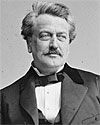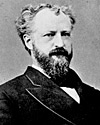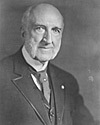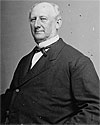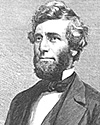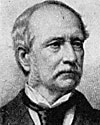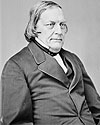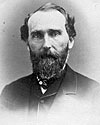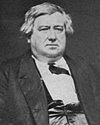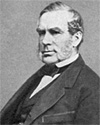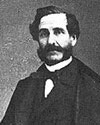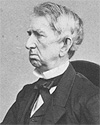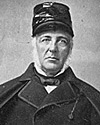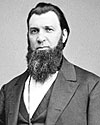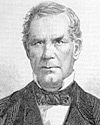“Following the Harpers Ferry raid [in 1859], political lines grew more taut than ever before. Into the rapidly swelling ranks of the Republican party poured radical Democrats, disgusted Whigs, rampant free-soldiers, and abolitionists. Into it also poured the foreign-born, conscious of their strength and dignity as ‘citizens’ rather than ‘subjects.’ Politicians, big and little, smelling victory in 1860 with all that it would mean in jobs and contracts, hopped aboard the Republican bandwagon. Nor were the financiers and industrialists far behind. All in all, it was as strange and varied in its multiple make-up and philosophy as was possible.” wrote historian Oliver Carlson.1
In 1860, Republicans in New York were growing, but they were also growing into factions. For two decades, William H. Seward and his political lieutenant, Thurlow Weed dominated first the Whig and then the Republican Party in New York State. For years, they had the help of New York Tribune editor Horace Greeley. But in 1854, the Seward-Weed machine blocked Greeley’s ambition to be nominated for Lieutenant Governor. On November 11, 1854, Greeley wrote Seward: “The election is over, and its result sufficiently ascertained. It seems to me a fitting time to announce to you the dissolution of the political firm of Seward, Weed, and Greeley, by the withdrawal to take effect on the morning after the first Tuesday in February next.”2 Greeley was upset that the Whigs nominated rival Henry J. Raymond, New York Times editor, for Lieutenant Governor and denied Greeley’s own aspirations for Governor. It was a doubt insult.
Seward “had other opponents than Greeley within his own party,” noted historian Chester L. Barrows. “Some of the former Democrats who had joined the Republican party could not forget that he had been a Whig; others disliked his early opposition to the Know-Nothings; still others resented his intimacy with Weed. Radicals like Wendell Phillips doubted the sincerity of his anti-slavery speeches; conservatives were alarmed by his prediction of the ‘irrepressible conflict.’ How serious the disaffection might be was unknown at the time of the Chicago national convention” in May 1860.3
Gideon Welles was a former Connecticut Democrat who had many friends among the former New York Democrats who affiliated with the Republican Party. He noted that the “Whig element became largely in the ascendant in the Republican party yet without the Democratic infusion that party would have been powerless in nearly every Northern as well as Southern State. This fact was recognized and generally admitted by earnest Republicans of every shade. There was, however, a class of old partisans nurtured and educated in the Whig party, imbued with all the prejudices and possessed of all the personal partialities of the party, who had drifted with the main current into the Republican organization without much regard for the doctrines and principles which led to its formation, but who with Cherished self-conceit seemed to consider it a phase of Whigism.” Welles, who did not appreciated this conceit, observed: “This was particularly the case in the State of New York, where partyism was all powerful with most of her active and leading polticians.”4
It was the old Whigs from New York who took the lead in forming the national Republican Party in Pittsburgh in 1856. As historian James A. Rawley wrote: “The work of the Republican convention was threefold. A set of resolutions written by Henry J. Raymond committed the party to the repeal of laws permitting slavery in the territories, to the admission of Kansas as a free State, and to the overthrow of the Democratic administration. The convention secondly achieved national consolidation through a Committee on Organization. This group named the National Executive Committee and made E[dwin].D. Morgan its chairman. The selection of Morgan was doubtless a recognition of New York’s strength, as well as of a rising political leader. For New York was the financial capital of the Union; here campaign funds must be raised from bankers and merchants among whom stood to the fore.”5
But when the new Republican Party held its first official convention in Philadelphia in June, Thurlow Weed worked for the presidential nomination of John C. Frémont rather than favorite son Seward — reasoning that the party nominee would lose in 1856 and that Seward’s best chance would be in 1860. Weed’s reasoning was sound. Frémont did lose, albeit with respect. And the Democratic Party did fragment during James Buchanan’s presidential term. “The Republican Party in 1860 was of too recent birth to have crystallized entirely. Composed of heterogeneous elements, of which the most important, the former Whigs and the former Free-soil Democrats, have no bond but a common attitude on the slavery question and had recently been actively opposed other issues, the resulting discord was especially prominent in New York,” wrote historian Sidney David Brummer.6
Newspapers played a critical role in defining political lines. According to Brummer, “The opponents of Weed had two powerful organs in Greeley’s Tribune and Bryant’s Post. But they lacked a general equal in political ability to Weed, and it was their misfortune to be led by so poor a politician as Greeley.”7 But despite these splits, noted Brummer, “The Republicans of New York State entered upon the campaign far more united than did their opponents, and this despite the grievous disappointment which Lincoln’s nomination caused to thousands. The evidence that Seward was the choice of the great majority of New York Republicans is quite conclusive. True, there was in the early part of the year activity among [Salmon P.] Chase’s friends, and in February the Tribune came out for [Edward] Bates. The opposition to Weed was to some extent synonymous with antagonism to Seward. H.B. Stanton, Lieutenant-Governor Campbell, and William Cullen Bryant privately at least were against Seward’s nomination. Yet, in a lengthy estimate of Republican sentiment throughout the State, written by a correspondent evidently strongly desirous of exaggerating the possibility of a split opinion the Republican ranks, the writer failed to find any section where considerable feeling against Seward existed except in Erie County, and there it was attributed to the wish to conciliate the friends of [former President Millard] Fillmore; the conclusion was reached that, taking the State as a whole, Seward was the first choice and the man whom a large majority of the Republicans desired to see nominated.”8
The initial round of conflict among New York Republican came at the Republican National Convention in Chicago in May 1860. Seward, back home in Auburn, New York, presumed that his organization would triumph. Ohio Senator Salmon P. Chase assumed that righteousness rather than organization would triumph although he wrote New York supporter James Briggs a year before the convention: “You do not say whether there has been an organization in New York nor what it has done.”9
The second round pf conflict came after the convention in a no-holds-barred brawl among rival newspaper editors. Henry J. Raymond of the New York Times and James Watson Webb of the Courier and Enquirer blamed the Tribune‘s Horace Greeley for Seward’s defeat. The editorial war that followed dredged up six years of political history and grievances.
The third round of the conflict came in December 1860 and January 1861 over which Republicans would receive Cabinet appointments in the new Lincoln Administration. An invitation by President-elect Lincoln to confer with Thurlow Weed frightened anti-Weed Republicans, who were aroused to press for the inclusion of Salmon P. Chase in the Cabinet and the exclusion of Simon Cameron.
The fourth round of conflict between the Weed and anti-Weed camps came in February 1861 when Horace Greeley challenged William M. Evarts for the U.S. Senate. Evarts’ biographer Chester L. Barrows wrote that Evarts “was well qualified for the office — a lawyer of rare ability, a leading Republican, an excellent debater and speaker, accustomed to the best society, and always a welcome figure on public occasions. He possessed nearly every gift and grace that nature could bestow. But there were drawbacks; he was not a politician in the usual sense; he had never sat in a legislative body; and still more important, he was too independent to please the political bosses.”10 Evarts, meanwhile, was the candidate of the nation’s reining political boss, Thurlow Weed. A third dark horse candidate, Ira Harris, had scattered support. “Three weeks before the election Evarts was unquestionably the favorite. But this fact led Greeley and Harris to concentrate their fire upon him,” wrote biographer Barrows. “But the main difficulty lay in Evarts’ independent attitude. He would not solicit votes. He left that to Weed.”11
Thurlow Weed’s leadership was a lighting rod for critics — especially among Radical Republicans. His influence waxed and waned during the Civil War. He had failed to obtain the presidential nomination for Seward in May 1860. He was unable to prevent the nomination of radical Republican James S. Wadsworth for governor in 1862 and he could not prevent being blamed for Wadsworth’s defeat. But he was instrumental three months later in arranging the election of outgoing Governor Edwin D. Morgan to the U.S. Senate. Historian Sidney David Brummer wrote: “Just before the nomination of Morgan by the caucus [in February 1863], Weed announced his retirement form the editorship of the Albany Evening Journal — to the intense satisfaction of the radicals; but this battle showed that he was still a power in the politics of the State. The high water mark of the anti-Weed wing during the war was probably attained at the state convention which nominated Wadsworth. By the following spring, the adherents of Weed seem to have been again on top, though not because of any growth of liking for his conservative views.”12
It wasn’t just New York Republicans who complained about the influence of Weed. In November 1863, President Lincoln responded to a letter from a Radical Republican critic, Michigan Senator Zachary Chandler, complaining about the influence of Thurlow Weed, Edward D. Morgan, and Montgomery Blair on the message he sent to Congress each December:
Your letter of the 15th marked ‘private’ was received today. I have seen Govr. Morgan & Thurlow Weed separately but not together, within the last ten days; but neither of them mentioned the forthcoming message or said anything so far as I can remember, which brought the thought of the message to my mind.
I am very glad the elections this autumn have gone favorably and that I have not by native depravity, or under evil influences, done anything bad enough to prevent the good result.
I hope to stand firm enough to not go backward, and yet not go forward fast enough to wreck the country’s cause.13
President Lincoln went to great lengths to keep New York Republican leaders happy — even if it meant pardoning a Confederate operative, Louis A. Welton, whom Mr. Lincoln clearly thought should be hanged. Lincoln biographer Carl Sandburg wrote: “Lincoln plainly believed the man to be a liar and a scoundrel taking profits out of trading with the enemy. Yet Lincoln pardoned Welton. It was the last week in August ’64. The three men asking Welton’s pardon were not to be thrust away with abrupt refusals. Lincoln wrote a statement giving his belief that Welton was a falsifier and a species of traitor intent on money-making from treason, and his further belief that Welton ought not to be pardoned. However if Messrs. [Edwin D.] Morgan, [Thurlow] Weed and [Henry J.] Raymond would on the same sheet with his statement of the case write their requests for Welton’s pardon it would be done in deference to their wishes. Two of the three petitioners did so. Welton was saved from prison. Lincoln held in his possession a paper which the opposition would have seized on as luridly scandalous had it been made public.” Weed and Raymond endorsed President Lincoln’s statement:
Mr. Louis A. Welton came from the rebel lines into ours with a written contract to furnish large supplies to the rebels, was arrested with the contract in his possession, and has been sentenced to imprisonment for it. He, and his friends, complain of this, on no substantial evidence whatever, but simply because his word, only given after his arrest, that he only took the contract as a means of escaping from rebel lines, was not accepted as a full defence. He perceives that if this had been true he would have destroyed the contract so soon as it had served his purpose in getting him across the lines; but not having done this, and being caught with the paper on him, he tells this other absurd story that he kept the paper in the belief that our government would join him in taking the profit of fulfilling the contract.
This is my understanding of the case; and I cannot conceive of a case of a man found in possession of a contract to furnish rebel supplies, who can not escape, if this be held a sufficient ground of escape. It is simply for the accused to escape by telling a very absurd and improbable story. Now, if Senator Morgan, and Mr. Weed, and Mr. Raymond, will not argue with me that I ought to discharge this man, but will, in writing on this sheet, simply request me to do it, I will do it solely in deference to their wishes.”14
New York Republicans found their best political opportunities in the first year of the war when Democratic divisions in New York City and Democratic defections to a “Union” movement helped them win even the mayorship of New York City. “Though the Democratic organization had refused to lay aside party, many who had formerly adhered to it disapprove of this action, and the ninth resolution increased the number of those who were ready to throw off the old ties,” in the autumn of 1861, wrote historian Sidney David Brummer. “The Republicans were generally inclined to a Union with whoever would join with them in support of the administration. Thurlow Weed favored such a movement. The Albany Evening Journal said in its editorial: ‘It is humiliating to find men only thinking of party when the Country is in peril;’ ‘There is nothing which the traitors so much desire, just now, as partisan contests at the North;’ ‘The popular sentiment seems to demand the nomination of a ticket composed of uncompromising friends of the Union, irrespective of party.’ A call issued by some half dozen men of various political antecedents, summoned a People’s convention to meet at Syracuse on September 10th, which was the same place, and one day previous to the time, already fixed for the Republican State Convention.”15
Political lines in New York State could be fluid in period. One of the leaders of the People’s Convention was former Assembly Speaker Thomas G. Alvord, a long-time Democrat aligned with the southern Breckinridge faction of the Democratic Party. The delegates included Republicans and New Yorkers associated with the Constitutional Union Party that had supported John Bell for President in the 1860 election. Historian Brummer wrote: “The Republicans [in their convention in the same hall] appointed a committee on order of business which conferred with the committee on nominations of the People’s convention. These two committees, after discussion, agreed on a ticket, including Daniel S. Dickinson for attorney-general, Horatio Ballard for secretary of state, and Lucius Robinson for comptroller.”16 Dickinson was a former Breckinridge Democrat while Robinson was a Republican and Ballard a Democrat. The ticket was rounded out by another Democrat and four more Republicans. On one other office, the two “Union” tickets differed. The Union effort had a mixed success across the state. Some Republican organizations adopted Union slates, others didn’t. But in November, the Union statewide slate won election over the Democrats by a landslide 107,000 votes. A broad coalition of Republicans, Union Republicans and Union Democrats controlled the incoming State Legislature.
In early 1862, the Republicans waffled on whether to seek a fusion ticket. Weed went to Europe as an presidential emissary and in his absence, both the Albany Evening Journal and the Republican State Committee advocated a pure Republican ticket while Union elements in the State Legislature such as Assembly Speaker Henry J. Raymond and Union state officials such as Daniel Dickinson advocated a Union approach. Leaders labored over policy documents that might be used as the basis for a Union movement in the fall campaign.
Ultimately, conservative Republicans led by Thurlow Weed sought to get agreement to rally behind conservative War Democrat John A. Dix. Weed failed. Republicans rallied behind another Union major general, James A. Wadsworth, a strong Republican advocate of emancipation. Wadsworth made it his campaign theme and his campaign failed. But his Radical Republicans took over the State Republican organization and installed State Senator Henry R. Low as State Republican Chairman, replacing businessman Simeon Draper, an ally of Thurlow Weed.
By 1863, Republicans in New York were on the defensive as a result of repeated military defeats and the prospect of military conscription. Republican-Union members in the 1863 State Legislature agreed on a “address” which attempted to place their partisan position on firm patriotic ground: “Dark shall be the day and bitter the wail that shall herald the triumph of this Rebellion, which shall roll back the civilization of the age and shroud in gloom the fairest and freest portion of the earth, which shall blast the hopes of the down-trodden millions in every land, and leave us to drain to the dregs the bitter cup of national humiliation and disgrace — to hang our heads in shame at the mention of our birthplace and our name, and earn for us the melancholy reflection that we have lost by our cowardice and faithlessness what our heroic fathers gained through suffering and blood….No, fellow-citizens, there can be no termination to this conflict which shall not concede the triumph of the Republic. However fondly we may wish for the better day,…we should still remember that the price of this return must never be the loss of liberty or the sacrifice of honor.”17
Republicans in New York escalated their internal battles during 1863. “In the State the conservative wing of the Republican-Union party was getting the upper hand; but the policies advocated by the radical faction were gradually being adopted by the administration at Washington. In an editorial of January 23rd [1863], Weed after assailing ‘Phillips, Greeley, Sumner & Co.,’ asked: ‘Where are we? And whence are we drifting?’ Finally, he became so disgusted that, after thirty-three years’ service, he resigned the editorship of the Albany Evening Journal and disposed of his interest in that paper, giving as reasons for his retirement the radical and irreconcilable differences between him and his part as to the best means of crushing the rebellion.”18 But Weed soon returned to his position at the Evening Journal. Weed’s party rallied around President Lincoln in the fall campaign in New York, according to historian James G. Randall: “The New York Republicans resolved in favor of maintaining the integrity of the Union and the supremacy of the Constitution over the whole national domain, insisted on strengthening the armies, condemned all who embarrassed the government, denounced misleading tenders of peace, and specifically expressed ‘gratitude…to the administration of Mr. Lincoln.”19 Republicans had mixed success in 1863 — losing the New York City mayorship but regaining comfortable control of the State Legislature.
That the Republicans would stage another electoral comeback in 1864 would not have been predicted by many politicians in New York or Washington as late as August 1864. The whole party seemed to be in extended disarray. But a series of mistakes by Democrats in Chicago and a series of victories by Union armies in the field contributed to a narrow Republican-Union victory in November 1864. Historian Sidney David Brummer wrote: “The Unionists won back the State, and fortified their hold by giving the ballot to the soldier. So great, however, were the internal dissensions in the party, so strongly intrenched were the Democrats in the local offices in the extreme southern counties, so promising was their outlook for controlling the spoils in the future, that in 1864 Lincoln carried the State by only a very small majority. The Unionists, or as they were soon after once more called, the Republicans, lost as a party in this State the legitimate fruits of the war; the Democrats came forth from it hopeful and powerful; and New York continued to be a well-contested battle ground.”20
Republican problems were outgrowths patronage and policy differences as well as the prospect of political defeat. Historian Brummer concluded: “The strife which in 1860 already showed its head in the Republican ranks of New York State persisted and grew in the successor of that party, so that the close of the war found the Unionists there sharply arrayed in two camps. These dissensions arose not merely from antagonism to Weed but also from differences over the questions arising out of the war. By 1865 what may be termed the first series of such issues, in contradistinction to those relating to construction, had been settled by the course of events in favor of the anti-Weed faction. Weed was still of influence in the party, but his power had been greatly shaken if not eclipsed during the period here considered. Though Seward was as yet looked upon as the head of the conservatives and was very probably consulted by Weed, the Secretary was apparently no longer active in state politics at the end of the war. Raymond had grown in political stature. While the later prominence of Fenton and Conkling had not fully appeared at the beginning of 1865, and the radical wing was still more or less guided by Greeley, nevertheless in personal leadership as in political issues the way had been prepared for the triumph of that faction; for within a short time from that date Seward, Weed, and Raymond all were overthrown on the question of supporting President Johnson, and Fenton constructed a radical machine which controlled the State.”21
Footnotes
- Oliver Carlson, The Man Who Made News: James Gordon Bennett, p. 298.
- William Alexander Linn, Horace Greeley, p. 174-175.
- Chester L. Barrows, William M. Evarts: Lawyer, Diplomat, Statesman, p. 90.
- Gideon Welles, “Letters of Gideon Welles”, The Magazine of History, Vol. 27, No. 1, p. 19-20.
- James A. Rawley, Edwin D. Morgan, 1811-1883: Merchant in Politics, p. 49.
- Sidney David Brummer, Political History of New York State During the Period of the Civil War, p. 17.
- Sidney David Brummer, Political History of New York State During the Period of the Civil War, p. 18-19.
- Sidney David Brummer, Political History of New York State During the Period of the Civil War, p. 62-63.
- Frederick J. Blue, Salmon P. Chase: A Life in Politics, p. 121 (Letter from Salmon P. Chase to James Brigs, April 7, 1859).
- Chester L. Barrows, William M. Evarts: Lawyer, Diplomat, Statesman, p. 97.
- Chester L. Barrows, William M. Evarts: Lawyer, Diplomat, Statesman, p. 97.
- Sidney David Brummer, Political History of New York State During the Period of the Civil War, p. 274.
- Michael Burlingame and John R. Turner Ettlinger, editor, Inside Lincoln’s White House: The Complete Civil War Diary of John Hay, p. 114 (Letter to Zachariah Chandler, November 20, 1863).
- Carl Sandburg, Abraham Lincoln: The Prairie and the War Years, p. 587-588.
- Sidney David Brummer, Political History of New York State During the Period of the Civil War, p. 165-166 (Albany Evening Journal, August 10, 1861).
- Sidney David Brummer, Political History of New York State During the Period of the Civil War, p. 168.
- Sidney David Brummer, Political History of New York State During the Period of the Civil War, p. 288-289 (New York Tribune, April 29, 1863).
- Sidney David Brummer, Political History of New York State During the Period of the Civil War, p. 291-292.
- James G. Randall, Lincoln the President: Midstream, p. 278-279.
- Sidney David Brummer, Political History of New York State During the Period of the Civil War, p. 446.
- Sidney David Brummer, Political History of New York State During the Period of the Civil War, p. 447.






